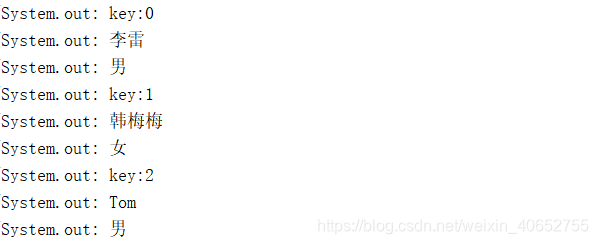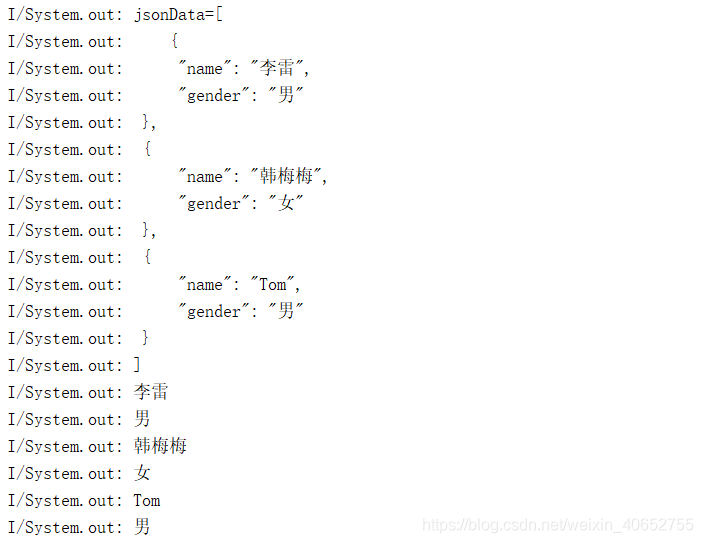First look at a piece of json data
{
"datas": {
"0": {
"name": "李雷",
"gender": "男"
},
"1": {
"name": "韩梅梅",
"gender": "女"
},
"2": {
"name": "Tom",
"gender": "男"
}
}
}
this. . .
If you use GsonFormat to generate beans in android, it will become like this:

Of course, this kind of non-standard json can be called back-end modification, but if he gives you a sentence: "Is this okay for ios? Come on, let's... something like that" what to do? Or all his interfaces are in this format. . . for example:

Well, let's parse this frustrating json:
Take the json shown at the beginning as an example, create a StudentBean, use the GsonFormat plug-in to generate code, only intercept the "array" part, and splicing a key to it (here we take student as an example), as shown in the figure:

student根据自己的情况命名,头部尾部添加 “{” 、“}”
Let’s analyze the json data again. It is actually an array of datas, but the key is uncertain and can be represented by a Map (the key of the json data is "datas", so the Map here should be named datas):
Map<String,Student> datas;
The final StudentBean looks like this:
public class StudentBean {
Map<String,Student> datas;
public Map<String, Student> getDatas() {
return datas;
}
public void setDatas(Map<String, Student> datas) {
this.datas = datas;
}
/**
* student : {"name":"Tom","gender":"男"}
*/
private Student student;
public Student getStudent() {
return student;
}
public void setStudent(Student student) {
this.student = student;
}
public static class Student {
/**
* name : Tom
* gender : 男
*/
private String name;
private String gender;
public String getName() {
return name;
}
public void setName(String name) {
this.name = name;
}
public String getGender() {
return gender;
}
public void setGender(String gender) {
this.gender = gender;
}
}
}
Parse:
final String jsonTest = "{
"datas": {
"0": {
"name": "李雷",
"gender": "男"
},
"1": {
"name": "韩梅梅",
"gender": "女"
},
"2": {
"name": "Tom",
"gender": "男"
}
}
}";
Gson gs = new Gson();
StudentBean bean = gs.fromJson(jsonTest.trim(), StudentBean.class);
Map<String, StudentBean.Student> studentMap = bean.getDatas();
for (String key : studentMap.keySet()) {
System.out.println("key:" + key);
System.out.println(studentMap.get(key).getName());
System.out.println(studentMap.get(key).getGender());
}
StudentBean has correctly described the format of json data, and you can use Gson.formJson to get the entity class;
Map<String, StudentBean.Student>: String corresponds to the uncertain Key in the data: "0", "1", "2" , StudentBean.Student is the data we want to get.
Finally, traverse the map to get the Student data, and output the result:

Dividing line///
Later, data such as this appeared again, and the data field outside was gone =-=:
{
"0": {
"name": "李雷",
"gender": "男"
},
"1": {
"name": "韩梅梅",
"gender": "女"
},
"2": {
"name": "Tom",
"gender": "男"
}
}
This situation is even simpler, just traverse JSONObject directly:
String test="{
"0": {
"name": "李雷",
"gender": "男"
},
"1": {
"name": "韩梅梅",
"gender": "女"
},
"2": {
"name": "Tom",
"gender": "男"
}
};
try {
JSONObject jsonObject = new JSONObject(test);
Iterator<String> keys = jsonObject.keys();
while (keys.hasNext()) {
String key = keys.next();
StudentBean.Student student = new Gson().fromJson(jsonObject.getString(key), StudentBean.Student.class);
System.out.println(key +" "+ student.getName() +" "+ student.getGender());
}
} catch (JSONException e) {
e.printStackTrace();
}
Result:

split line ///
and then:
[
{
"name": "李雷",
"gender": "男"
},
{
"name": "韩梅梅",
"gender": "女"
},
{
"name": "Tom",
"gender": "男"
}
]
All right! In fact, it’s almost the same, let’s go directly to the code:
String jsonData = "[ \n" +
" {\n" +
"\t\t\"name\": \"李雷\",\n" +
"\t\t\"gender\": \"男\"\n" +
"\t},\n" +
"\t{\n" +
"\t\t\"name\": \"韩梅梅\",\n" +
"\t\t\"gender\": \"女\"\n" +
"\t},\n" +
"\t{\n" +
"\t\t\"name\": \"Tom\",\n" +
"\t\t\"gender\": \"男\"\n" +
"\t}\n" +
"]";
System.out.println("jsonData=" + jsonData);
try {
JSONArray itemArray = new JSONArray(jsonData);
for (int i = 0; i < itemArray.length(); i++) {
StudentBean.Student bean = new Gson().fromJson(itemArray.get(i).toString(), StudentBean.Student.class);
System.out.println(bean.getName());
System.out.println(bean.getGender());
}
} catch (JSONException e) {
// TODO Auto-generated catch block
e.printStackTrace();
}
operation result:
